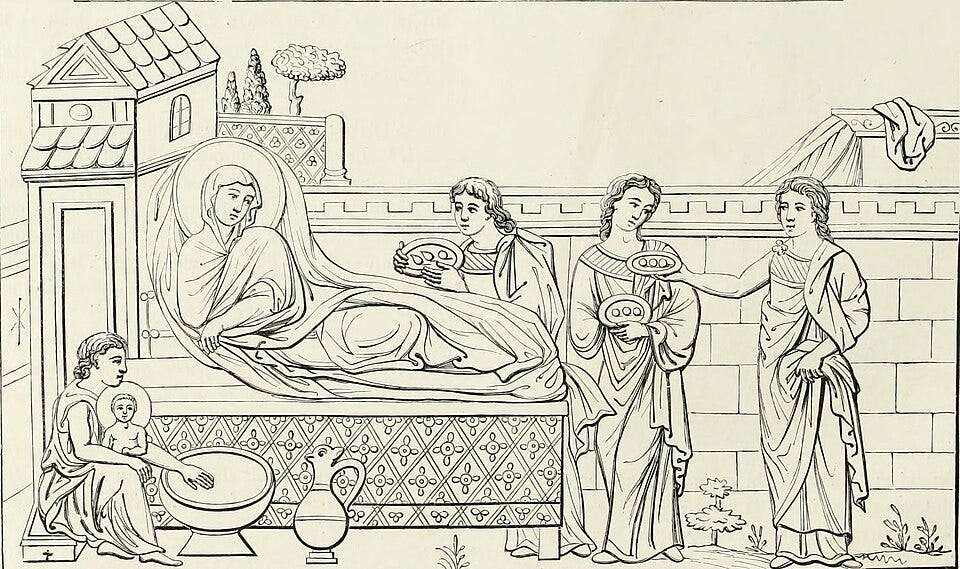What Do The Saints Say About Taking A Bath?
"Likewise, water is not naturally a bath, but water through art is made a bath"
“Taking a bath is nice :)”
Thomas Aquinas, Article 5, Question 38, First Part of the Second Part, Summa Theologica
Whether pain and sorrow are assuaged by sleep and baths?
Objection 1. It would seem that sleep and baths do not assuage sorrow. For sorrow is in the soul: whereas sleep and baths regard the body. Therefore they do not conduce to the assuaging of sorrow.
Objection 2. Further, the same effect does not seem to ensue from contrary causes. But these, being bodily things, are incompatible with the contemplation of truth which is a cause of the assuaging of sorrow, as stated above (Article 4). Therefore sorrow is not mitigated by the like.
Objection 3. Further, sorrow and pain, in so far as they affect the body, denote a certain transmutation of the heart. But such remedies as these seem to pertain to the outward senses and limbs, rather than to the interior disposition of the heart. Therefore they do not assuage sorrow….
I answer that, As stated above (I-II:37:4), sorrow, by reason of its specific nature, is repugnant to the vital movement of the body; and consequently whatever restores the bodily nature to its due state of vital movement, is opposed to sorrow and assuages it. Moreover such remedies, from the very fact that they bring nature back to its normal state, are causes of pleasure; for this is precisely in what pleasure consists, as stated above (I-II:31:1). Therefore, since every pleasure assuages sorrow, sorrow is assuaged by such like bodily remedies.
“If a bath doesn’t do the trick, a nap will.”
Augustine of Hippo, Book IX, Confessions
It seemed also good to me to go and bathe, having heard that the bath had its name (balneum) from the Greek Balaneion for that it drives sadness from the mind. And this also I confess unto Thy mercy, Father of the fatherless, that I bathed, and was the same as before I bathed. For the bitterness of sorrow could not exude out of my heart. Then I slept, and woke up again, and found my grief not a little softened.
“Only if you really need one.”
Benedict of Nursia, Chapter XXXVI (Concerning the sick and infirm), The Rule
“Let the use of baths be allowed the sick as often as is expedient; but to those in good health and especially to the young let it be conceded less readily.”
“Yes, but you shouldn’t enjoy it. And if you’re thinking about taking a bath to warm up, just do jumping jacks.”
Clement of Alexandria, Chapter Five, Book Three, The Paedagogus
There are, then, four reasons for the bath (for from that point I digressed in my oration), for which we frequent it: for cleanliness, or heat, or health, or lastly, for pleasure. Bathing for pleasure is to be omitted. For unblushing pleasure must be cut out by the roots; and the bath is to be taken by women for cleanliness and health, by men for health alone. To bathe for the sake of heat is a superfluity, since one may restore what is frozen by the cold in other ways.
“Did not Our Lord take a bath from time to time? If He was not too good for baths, then neither are you.”
Anselm of Canterbury, Meditations and Prayers
And notice besides how tenderly and lovingly the blessed Nicodemus lays his fingers on the all-holy Limbs, bathes Them with unguents, and assisted by St. Joseph, lays Him wound round with linen in the sepulchre.
“???”
William of Ockham, Summula
A statue, in contrast, truly is a natural thing, and so is a bath…For instance, if one states the proposition A statue is not a natural thing one should understand through this the proposition that No natural thing is naturally a statue since no thing is made a statue through nature, but is made a statue only through art.
Likewise, water is not naturally a bath, but water through art is made a bath. Still, this notwithstanding, the only thing that is a bath or exists in the bath is something natural. For one water differs from another water only in its having heat or being mixed with herbs or being in some specific place, none of which imply anything in that water other than a thing that is natural. So if water gets put in a certain place and then later gets made made hot by nature, the whole would be natural and would be a bath, and yet would be distinguished in no respect from another that was made a bath through art.
“Do not stop taking a bath until you have regained your sanity.”
Hildegard of Bingen, Physica
Also, cook the twigs and leaves of this tree [elm] in water, and make a bath. Place one who is out of his mind in this bath. Having shaved his hair, dip a linen cloth in the water, so that it is wet and warm, and carefully warm his head while he is in the bath. After he comes out of the bath, put him in bed. Then cook the fruit of this tree in water. Pour off the water, and place the cooked, warm fruit on his head. Tie it with a cloth, so that he may sleep with it on. Do this often, and he will be better and recover his senses.
[Image via]



Hildegard FTW!!!!
“If a bath doesn’t do the trick, a nap will.”
This is true for a babe and it is true for a grown man.